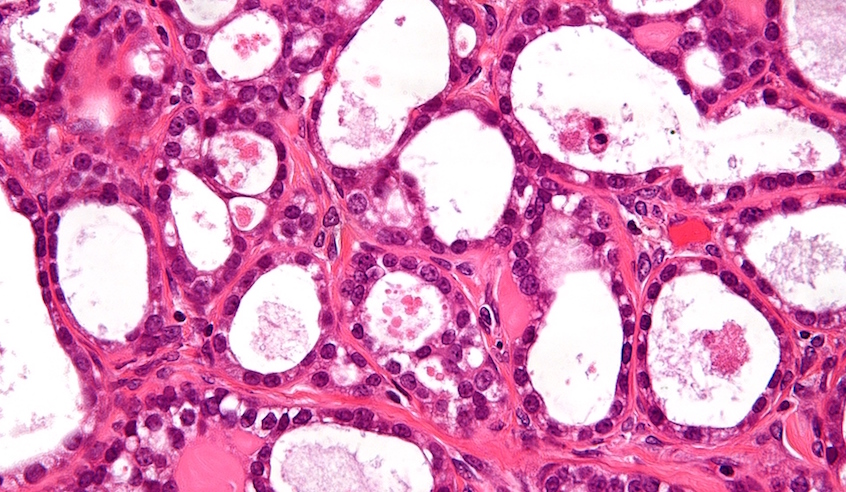
A high magnification image of ovarian clear cell carcinoma. Image credit: Copyright © 2011 Michael Bonert. Licence: CC BY-SA 3.0.
Scientists have developed a new highly sensitive blood test to deliver precision medicine to women with BRCA mutations who have breast or ovarian cancer.
The test detects changes in the BRCA1 or BRCA2 genes that mean the cancer will no longer respond to platinum chemotherapy or targeted drugs called PARP inhibitors.
In future, it could be used to monitor women treated with these drugs so that those who begin to resist treatment can be switched to alternative therapies as early as possible, before the cancer starts to progress.
Scientists at The Institute of Cancer Research, London, used the new test, known as a ‘liquid biopsy’, to analyse blood samples from 24 women who had an inherited fault in one of the cancer risk genes BRCA1 or BRCA2.
The new study, largely funded by Breast Cancer Now in the UK and published today in the journal Clinical Cancer Research, was carried out in collaboration with researchers at the Memorial Sloan Kettering Cancer Center in New York.
Blood test finds changes in tumour DNA
Women who inherit errors in the genes BRCA1 or BRCA2 are particularly responsive to drugs that target cancer’s ability to repair its DNA – such as platinum chemotherapies or new drugs called PARP inhibitors.
One such drug, olaparib, is now approved to treat women with ovarian cancer with BRCA mutations, and a recent phase III trial showed that PARP inhibitors could also benefit women with BRCA-mutant breast cancer.
Scientists at the Breast Cancer Now Toby Robins Research Centre at The Institute of Cancer Research (ICR) – a research institute and charity – worked with their US colleagues to study blood samples from women who were treated at The Royal Marsden NHS Foundation Trust or at Memorial Sloan Kettering.
They developed the blood test to be highly sensitive, because only very small amounts of tumour DNA are present in a patient’s blood.
The researchers studied samples from women who had previously been treated with platinum chemotherapy or PARP inhibitors, but for whom these drugs no longer worked.
The new blood test found several changes in the tumour DNA, which enabled cancer cells that had previously been stopped by treatment to continue growing.
The DNA changes detected in the blood samples were not found in tumour tissue taken when the women were first diagnosed, suggesting that they arose during treatment.
Importantly, the different changes in tumour DNA found in the blood samples all reactivated the ability of cancer cells to repair damage caused by targeted drugs or platinum chemotherapy.
The study also provides new clues that will help researchers understand how cancers can evolve to develop drug resistance.
They found DNA changes to allow tumours to resist treatment in the blood of four out of 19 women with ovarian cancer, and of two out of five with breast cancer – 21% and 40%, respectively.
In four out of six of the women who developed resistance mutations, the tumour DNA contained more than one change – suggesting that cancer finds multiple different ways to resist targeted drugs.
The work was also funded by the National Cancer Institute in the US, with support from the NIHR Biomedical Research Centre at The Royal Marsden and the ICR.
Precision medicine delivering real benefits
Professor Nicholas Turner, Professor of Molecular Oncology at the ICR, and Consultant Medical Oncologist at The Royal Marsden NHS Foundation Trust, said:
“With this new liquid biopsy, we picked up changes in tumour DNA that could give us early warning if a woman’s cancer is likely to stop responding to treatment.
“Next, we aim to further evaluate the blood test as part of a large clinical trial. Our study also opens up further research into how to stop cancer evolving to become resistant to targeted drugs.
“In the future, this liquid biopsy could help us pick out those women with breast or ovarian cancer who are most likely to benefit from targeted therapy, and offer alternative treatment to women as soon as they develop drug resistance.”
Professor Paul Workman, Chief Executive of the ICR, said:
“Precision medicine is now delivering real benefits for many women with breast and ovarian cancer – but drug resistance is still an important challenge.
“The DNA changes identified with this new liquid biopsy test could help us understand how cancer evolves to become resistant to treatment.
“The new test could lead to a more effective therapeutic strategy for women with mutations in the BRCA cancer risk genes, by picking out those who are likely to stop responding to platinum chemotherapy or targeted treatment, and allowing treatment to be adjusted.”
Research at the ICR is underpinned by generous contributions from our supporters. Find out more about how you can contribute to our mission to make the discoveries to defeat cancer.
Outsmarting breast cancers
Baroness Delyth Morgan, Chief Executive at Breast Cancer Now, which helped to fund the study, said:
“That this test could detect drug resistance in cancer patients with BRCA1/2 mutations at such an early stage is highly exciting.
“Drug resistance remains a major barrier to stopping more women dying from breast cancer. Yet this innovative method could enable the ‘real-time’ tracking of a patient’s response to treatment, allowing doctors to swiftly change therapies that women won’t benefit from and spare them any unnecessary side-effects.
“Through liquid biopsies, we hope to begin outsmarting breast cancers – with treatment choices guided not by surgical knives or biopsy needles, but by the wealth of information in a small amount of blood.
“We now eagerly await a large clinical trial, in the hope this liquid biopsy will bring us closer to tailoring treatment to patients’ tumours in the clinic, ensuring everyone is given the best possible chance of survival.”